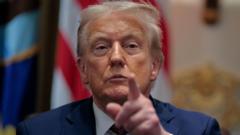Did India Just Offer to Eliminate Tariffs on U.S. Goods?

Published: 2025-09-02 05:45:16 | Category: world
A recent exchange between US President Donald Trump and Indian officials highlights growing tensions in US-India trade relations amidst geopolitical shifts. Trump claims that India has offered to eliminate tariffs entirely, while simultaneously criticising the trade relationship as heavily imbalanced. This tension arises as India continues to purchase oil from Russia, drawing sharp rebukes from Washington. The situation underscores the complexities of international trade, especially in light of India’s strategic energy needs and its burgeoning ties with Russia and China.
Last updated: 26 October 2023 (BST)
Key Takeaways
- Trump criticises India's trade practices and pushes for tariff reductions.
- India's oil imports from Russia have become a focal point in US-India relations.
- The recent tariffs imposed by the US have raised concerns over India's economic growth.
- India maintains that its energy needs necessitate Russian oil imports.
- At the SCO summit, Modi's engagement with Putin raises eyebrows amid US tensions.
Understanding the Current Trade Dispute
The ongoing trade dispute between the United States and India centres primarily on tariffs and energy imports. President Trump has labelled the current trade dynamics as "a totally one-sided disaster," claiming that the US does significantly more business with India than vice versa. He argues that India's tariff policies have hindered trade progress, urging Indian officials to eliminate tariffs which he suggests should have been done "years ago."
Tariffs and Their Impacts
As of last week, US tariffs on certain Indian goods have reached as high as 50%, largely influenced by India's continued oil purchases from Russia. These tariffs include a 25% penalty specifically targeting India’s refusal to reduce its Russian oil imports, a decision that Washington views as indirectly supporting Russia during its ongoing conflict in Ukraine.
India's Response to Tariffs
India has not publicly responded to Trump’s recent comments, but it has previously described the US tariffs as "unfair, unjustified and unreasonable." India's Commerce Minister Piyush Goyal has asserted the country’s resilience, stating that India "will neither bow down nor ever appear weak" in its economic relationships. Furthermore, he indicated India's openness to negotiating free trade agreements with other nations, reflecting a commitment to expanding its trade partnerships despite US pressures.
Strategic Energy Needs and Geopolitical Ties
India's reliance on Russian oil is not merely a matter of trade; it is a critical component of the country's energy strategy. With a vast population and growing energy demands, India has stated that sourcing oil from Russia is vital. This dependence has placed India at odds with the US, which accuses it of indirectly supporting Russia's military actions through these purchases.
US Concerns Over Energy Imports
Trump's comments highlight a broader concern in Washington about India’s strategic choices in energy sourcing and military procurement. By purchasing a significant portion of its oil and military supplies from Russia, India is viewed as prioritising its immediate energy needs over diplomatic relations with the US. This situation has led to a deterioration in bilateral ties, with some analysts suggesting that these tensions could hinder future trade negotiations.
The Shanghai Cooperation Organisation Summit
Trump's remarks coincided with Indian Prime Minister Narendra Modi's attendance at the Shanghai Cooperation Organisation (SCO) summit in Tianjin, where he met with Russian President Vladimir Putin and Chinese President Xi Jinping. This summit is significant as it represents a bloc of nations that some perceive as challenging US dominance on the global stage. The interactions between Modi and Putin, particularly their 45-minute discussion, signal India's intent to strengthen ties with Russia amidst US scrutiny.
The Historical Context of US-India Trade Relations
The US and India have a long history of economic interaction, with the US being India's largest trading partner until recently. However, the imposition of tariffs has raised fears that India's economic growth could be jeopardised, particularly as it navigates the complexities of its relationships with both the US and Russia. The current trade dynamics reflect a shifting landscape where India's geopolitical priorities may conflict with its economic interests.
Future Prospects for Trade Relations
Looking ahead, the potential for a resolution in US-India trade relations remains uncertain. The ongoing geopolitical tensions, particularly regarding energy imports from Russia, will likely continue to shape the discourse between the two nations. Should India maintain its current energy procurement strategy, it may face further retaliatory measures from the US.
The Role of Global Markets
The interplay between global markets and national interests is pivotal in this context. As India seeks to balance its energy needs with its international relationships, it must navigate a complex web of trade agreements and geopolitical alliances. The outcome of these negotiations could have lasting implications for both Indian and US economies.
Conclusion: What Lies Ahead?
The current trade tensions between the US and India highlight the intricate balance of economic needs and international diplomacy. As both nations grapple with their respective positions on tariffs and energy procurement, the potential for a more equitable trade relationship hangs in the balance. The evolving dynamics of global politics, especially concerning energy and military alliances, will continue to influence these negotiations. As nations adapt to shifting alliances and economic realities, the question remains: how will global trade be reshaped in an increasingly multipolar world?
FAQs
What are the current tariffs imposed by the US on Indian goods?
The US has imposed tariffs of up to 50% on certain Indian goods, including a 25% penalty related to India's continued oil purchases from Russia.
Why is India purchasing oil from Russia despite US objections?
India considers its oil imports from Russia essential to meet its energy needs, especially given its vast population and growing demand for energy resources.
How have US-India trade relations changed over time?
Historically, the US was India's largest trading partner, but recent tariff disputes and geopolitical tensions have strained this relationship significantly.
What did Modi discuss with Putin at the SCO summit?
Modi and Putin reportedly had an "insightful" exchange during their meeting, focusing on strengthening bilateral ties amidst the backdrop of US scrutiny.
What is the Shanghai Cooperation Organisation (SCO)?
The SCO is a regional political, economic, and security alliance that includes countries like China, India, Russia, and several Central Asian nations, aimed at fostering collaboration and countering US influence.



